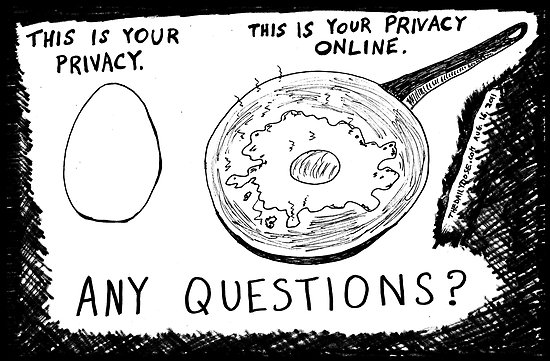
"The telescreen received and transmitted simultaneously. Any sound that Winston made, above the level of a very low whisper, would be picked up by it, moreover, so long as he remained within the field of vision which the metal plaque commanded, he could be seen as well as heard." – "1984" by George Orwell (Part One, Chapter One).
George Orwell was not talking about privacy policies in 1984, but something extremely creepy was pointed out.
How often do we scroll down a privacy policy without going through it properly, and eventually hit the 'Accept Terms and Conditions' button? We are guessing too often. Most of us are of the notion that reading it fully is just waste of time and agreeing to whatever is in front of us makes the process faster.
In an era where privacy policies are detailed, full of complications and require a second look, it's often dangerous to agree to anything that you aren't sure about. You may not end up like South Park's Kyle (who agreed to Apple's terms without looking), but things could get a lot serious before you know it.
We have already come across the newly tweaked privacy policy that was laid down by Facebook last week. According to the company, the changes would allow the company to gather data from all users' activity, irrespective of whatever website they are browsing. And now, it seems like Samsung might be treading on a similar path.
Samsung, which is responsible for a series of Internet connected TVs, has an auxiliary privacy policy covering its Smart TVs. Interestingly, the privacy policy includes the following section on voice recognition:
"Samsung may collect and your device may capture voice commands and associated texts so that we can provide you with Voice Recognition features and evaluate and improve the features. Please be aware that if your spoken words include personal or other sensitive information, that information will be among the data captured and transmitted to a third party through your use of Voice Recognition."
Have you read the above mentioned part of the policy full? Noticed anything strange? Well, the last part of the policy is disturbing, to say the least. It clearly states that the user needs to be careful about his or her conversation in front of the TV if it includes "personal or other sensitive information," else it will be "transmitted to a third party through your use of Voice Recognition."
But where does George Orwell fit into all this? Incidentally, an Electronic Frontier Foundation activist pointed out recently, via Twitter, that the concept of a TV screen snooping on your private conversation is directly out of George Orwell's 1984. He put in both the highlighted pages side-by-side and brought out a chilling similarity.
That said, Samsung does take out time in the policy to notify its users against talking about anything personal in front of the TV, although carefully masking it. Moreover, these warnings are enclosed within the most unobserved type of documents on the Internet, and can easily be overlooked by the standard user.
If you are wondering how to bypass this problem, Samsung does indeed allow you to disable the snooping voice recognition feature and make use of a more limited set of predefined 'voice commands,' adding that the TV won't listen into the users' spoken words in that case.
However, there's no complete escape. The policy states: "If you do not enable Voice Recognition, you will not be able to use interactive voice recognition features, although you may be able to control your TV using certain predefined voice commands."
"While Samsung will not collect your spoken word, Samsung may still collect associated texts and other usage data so that we can evaluate the performance of the feature and improve it," it adds.
Nonetheless, Samsung has provided a statement about the working of its Voice Recognition SmartTV feature to TechCrunch. It states: "In all of our Smart TVs we employ industry-standard security safeguards and practices, including data encryption, to secure consumers' personal information and prevent unauthorized collection or use."
Voice recognition, which allows the user to control the TV using voice commands, is a Samsung Smart TV feature, which can be activated or deactivated by the user. The TV owner can also disconnect the TV from the Wi-Fi network. Should consumers enable the voice recognition capability, the voice data consists of TV commands or search sentences only. Users can easily recognize if the voice recognition feature is activated because a microphone icon appears on the screen.
Samsung does not retain voice data or sell it to third parties. If a consumer consents and uses the voice recognition feature, voice data is provided to a third party during a requested voice command search. At that time, the voice data is sent to a server, which searches for the requested content then returns the desired content to the TV."
Do you think use of such sensitive and intrusive tech is ethical in today's online-oriented world? If so, how safe do you think you information is from the all prying eyes out there? Let us know in the comments section below.

















